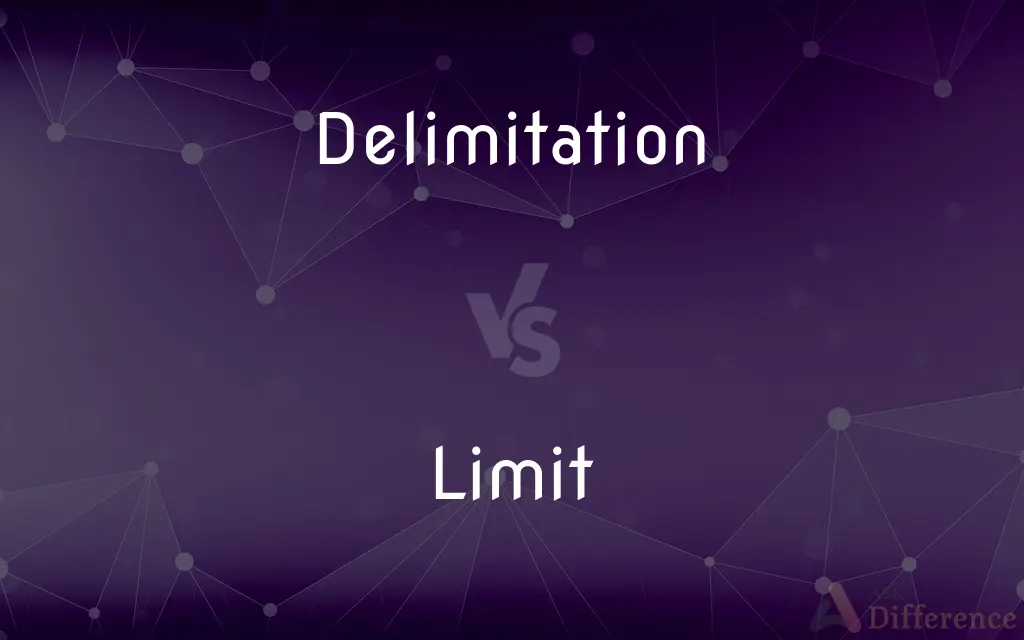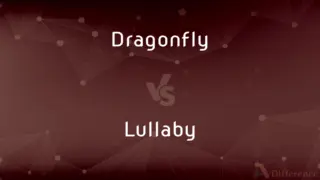Delimitation vs. Limit — What's the Difference?
By Fiza Rafique & Urooj Arif — Updated on March 29, 2024
Delimitation involves setting boundaries or defining the scope of something, while a limit refers to the maximum extent or boundary of an area or concept.

Difference Between Delimitation and Limit
Table of Contents
ADVERTISEMENT
Key Differences
Delimitation is a process or action that involves establishing the boundaries or scope of a study, project, or discussion, explicitly stating what is included and what is excluded. It's about drawing lines that define the extent of an investigation or the parameters within which a project operates. In contrast, a limit is more about the end point or boundary beyond which something does not or cannot extend or occur. It's a point or level that marks the extent of something's capacity, range, or permission.
In academic research, delimitation is crucial for narrowing down a study's focus, making it clear what the study will cover and what it will not. This specificity helps in managing expectations and clarifying the study's intentions. On the other hand, limits are often discussed in terms of physical or theoretical boundaries, such as the speed limit, which defines the maximum speed allowed, or the limit of human endurance.
Delimitations are subject to the discretion of the person or entity defining the scope and can be adjusted based on the objectives or resources available. They are often set at the beginning of a project or study. Conversely, limits are typically perceived as more fixed and non-negotiable, often determined by laws, rules, or physical capabilities.
The concept of delimitation is also applicable in geography, where it refers to the process of establishing the borders between political or administrative entities, such as countries or states. Whereas, limits in geography might refer to natural barriers that define the extent of an area, like mountains or rivers.
In the context of discussions or negotiations, delimitations help in setting the agenda by outlining the topics to be covered, while understanding limits can be crucial for recognizing the points beyond which negotiation is not possible, thereby defining the range of possible compromises or solutions.
ADVERTISEMENT
Comparison Chart
Definition
Establishing boundaries or scope
Maximum extent or boundary
Context
Often used in research, projects, and discussions
Used in various contexts, including physical and theoretical boundaries
Flexibility
Subject to adjustment based on objectives
Typically fixed and non-negotiable
Purpose
To clarify scope and manage expectations
To define end points or maximum capacities
Application
Academic research, geography, discussions
Laws, rules, physical capabilities, geography
Compare with Definitions
Delimitation
Adjustable based on project goals.
Delimitation was revised to include new data sources.
Limit
The boundary of human endurance.
Marathon runners often push the limits of their endurance.
Delimitation
Critical in academic research for clarity.
The study’s delimitation was clearly outlined in the introduction.
Limit
Involves physical or theoretical boundaries.
The limit of this material’s strength was tested.
Delimitation
Used in geography for setting political borders.
The delimitation of new administrative districts was announced.
Limit
The maximum speed allowed.
The speed limit on this road is 55 mph.
Delimitation
Establishing the scope of a study.
The delimitation of the research included urban areas only.
Limit
Fixed by laws or rules.
There is a limit to how many items you can return.
Delimitation
Defining what is included or excluded in a project.
Delimitation helped focus the discussion on relevant topics.
Limit
Determines the extent of an area.
The city limits were expanded to include the suburbs.
Delimitation
To establish the limits or boundaries of; demarcate.
Limit
The point, edge, or line beyond which something ends, may not go, or is not allowed
The 12-mile fishing limit.
The limit of my patience.
Delimitation
The act of delimiting something.
Limit
Limits The boundary surrounding a specific area; bounds
Within the city limits.
Delimitation
A limit or boundary.
Limit
Something that restricts or restrains; a restraint
The child needs to have limits put on his behavior.
Delimitation
The act or process of fixing limits or boundaries; limitation.
Limit
The greatest or least amount, number, or extent allowed or possible
A withdrawal limit of $200.
No minimum age limit.
Delimitation
A line that indicates a boundary
Limit
(Games) The largest amount which may be bet at one time in games of chance.
Limit
A number or point L that is approached by a function f(x) as x approaches a if, for every positive number ε, there exists a number δ such that |f(x)-L| < ε if |x-a| < δ.
Limit
A number or point L that is approached by a sequence bn if, for every positive number ε, there exists a number N such that |bn-L| < ε if n > N. Also called limit point.
Limit
(Informal) One that is intolerable, remarkable, or extreme in some other way
"That's the limit!" the babysitter exclaimed after the child spilled a glass of milk.
Limit
To confine or restrict with a limit
Let's limit the discussion to what is doable. The offer limits us to three for a dollar.
Limit
A restriction; a bound beyond which one may not go.
There are several existing limits to executive power.
Two drinks is my limit tonight.
Limit
(mathematics) A value to which a sequence converges. Equivalently, the common value of the upper limit and the lower limit of a sequence: if the upper and lower limits are different, then the sequence has no limit (i.e., does not converge).
The sequence of reciprocals has zero as its limit.
Limit
(mathematics) Any of several abstractions of this concept of limit.
Category theory defines a very general concept of limit.
Limit
(category theory) The cone of a diagram through which any other cone of that same diagram can factor uniquely.
Limit
(poker) Fixed limit.
Limit
The final, utmost, or furthest point; the border or edge.
The limit of a walk, of a town, or of a country
Limit
(obsolete) The space or thing defined by limits.
Limit
(obsolete) That which terminates a period of time; hence, the period itself; the full time or extent.
Limit
(obsolete) A restriction; a check or curb; a hindrance.
Limit
A determining feature; a distinguishing characteristic.
Limit
(cycling) The first group of riders to depart in a handicap race.
Limit
A person who is exasperating, intolerable, astounding, etc.
Limit
(poker) Being a fixed limit game.
Limit
(transitive) To restrict; not to allow to go beyond a certain bound, to set boundaries.
We need to limit the power of the executive.
I'm limiting myself to two drinks tonight.
Limit
To have a limit in a particular set.
The sequence limits on the point a.
Limit
(obsolete) To beg, or to exercise functions, within a certain limited region.
A limiting friar
Limit
That which terminates, circumscribes, restrains, or confines; the bound, border, or edge; the utmost extent; as, the limit of a walk, of a town, of a country; the limits of human knowledge or endeavor.
As eager of the chase, the maidBeyond the forest's verdant limits strayed.
Limit
The space or thing defined by limits.
The archdeacon hath divided itInto three limits very equally.
Limit
That which terminates a period of time; hence, the period itself; the full time or extent.
The dateless limit of thy dear exile.
The limit of your lives is out.
Limit
A restriction; a check; a curb; a hindrance.
I prithee, give no limits to my tongue.
Limit
A determining feature; a distinguishing characteristic; a differentia.
Limit
A determinate quantity, to which a variable one continually approaches, and may differ from it by less than any given difference, but to which, under the law of variation, the variable can never become exactly equivalent.
Limit
To apply a limit to, or set a limit for; to terminate, circumscribe, or restrict, by a limit or limits; as, to limit the acreage of a crop; to limit the issue of paper money; to limit one's ambitions or aspirations; to limit the meaning of a word.
Limit
To beg, or to exercise functions, within a certain limited region; as, a limiting friar.
Limit
The greatest possible degree of something;
What he did was beyond the bounds of acceptable behavior
To the limit of his ability
Limit
Final or latest limiting point
Limit
The boundary of a specific area
Limit
As far as something can go
Limit
The mathematical value toward which a function goes as the independent variable approaches infinity
Limit
The greatest amount of something that is possible or allowed;
There are limits on the amount you can bet
It is growing rapidly with no limitation in sight
Limit
Place limits on (extent or access);
Restrict the use of this parking lot
Limit the time you can spend with your friends
Limit
Restrict or confine,
I limit you to two visits to the pub a day
Limit
Decide upon or fix definitely;
Fix the variables
Specify the parameters
Common Curiosities
Is a speed limit considered a delimitation?
No, a speed limit is an example of a limit, defining the maximum speed allowed, not the scope of a study or project.
How important is delimitation in research?
Delimitation is crucial in research for specifying the study's scope, which helps in managing expectations and ensuring clarity.
Can limits be negotiated or changed?
While some limits can be adjusted (e.g., legal limits through new legislation), others are fixed by physical or theoretical constraints.
Can delimitations change over time?
Yes, delimitations can be adjusted based on objectives or new findings, unlike limits, which are often fixed.
What role do limits play in geography?
In geography, limits can refer to natural boundaries that define the extent of an area, like rivers or mountain ranges.
How does understanding limits help in negotiations?
Knowing the limits helps identify non-negotiable points, guiding the range of possible compromises or solutions.
Can a limit also be a delimitation in some contexts?
In some contexts, limits might serve as delimitations, especially when they define the scope of activities or research parameters.
What is the significance of delimitation in setting agendas?
Delimitation helps in setting clear agendas by outlining the topics to be discussed, ensuring focused and productive discussions.
What distinguishes delimitation from a limit?
Delimitation is about defining the scope or boundaries of something, while a limit refers to the maximum extent or boundary itself.
How do limits affect design and engineering?
In design and engineering, limits can define the maximum capacities or tolerances, guiding the development of safe and effective products.
Can cultural contexts influence delimitations and limits?
Yes, cultural perceptions and societal norms can influence how delimitations are set and what is considered as limits in different contexts.
Does delimitation apply only to academic research?
No, delimitation can also apply to projects, discussions, and geographical boundaries, wherever defining a scope is necessary.
Are there limits to what can be delimited?
Theoretically, yes; practical, ethical, or resource constraints can limit how broadly or narrowly something can be delimited.
Why are delimitations revised in research?
Delimitations may be revised to accommodate new data, changes in project scope, or to refine the research focus.
How does one determine the delimitations of a project?
Delimitations are determined based on the project's goals, available resources, and any specific objectives it aims to achieve.
Share Your Discovery

Previous Comparison
Lengthwise vs. Lengthways
Next Comparison
Dragonfly vs. LullabyAuthor Spotlight
Written by
Fiza RafiqueFiza Rafique is a skilled content writer at AskDifference.com, where she meticulously refines and enhances written pieces. Drawing from her vast editorial expertise, Fiza ensures clarity, accuracy, and precision in every article. Passionate about language, she continually seeks to elevate the quality of content for readers worldwide.
Co-written by
Urooj ArifUrooj is a skilled content writer at Ask Difference, known for her exceptional ability to simplify complex topics into engaging and informative content. With a passion for research and a flair for clear, concise writing, she consistently delivers articles that resonate with our diverse audience.















































